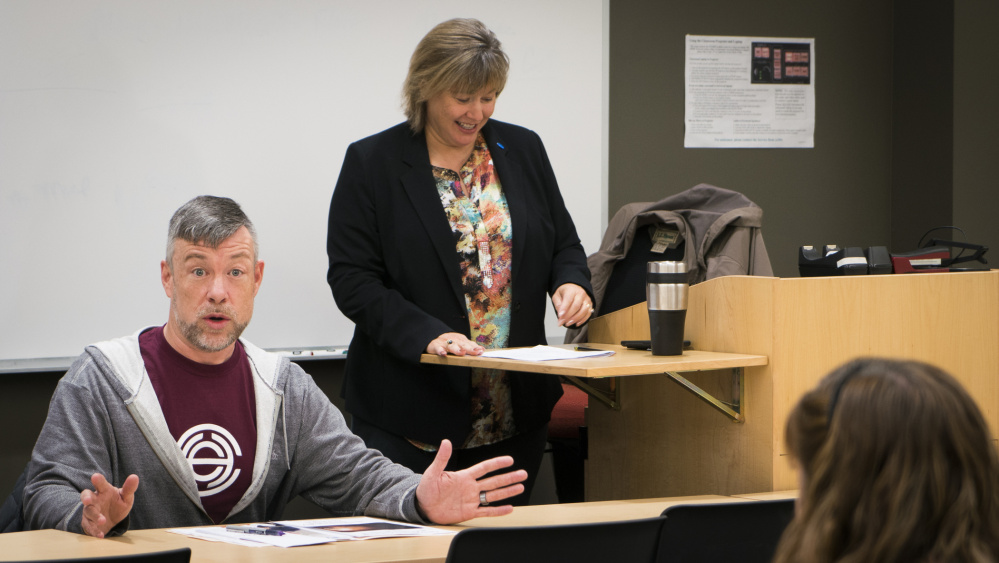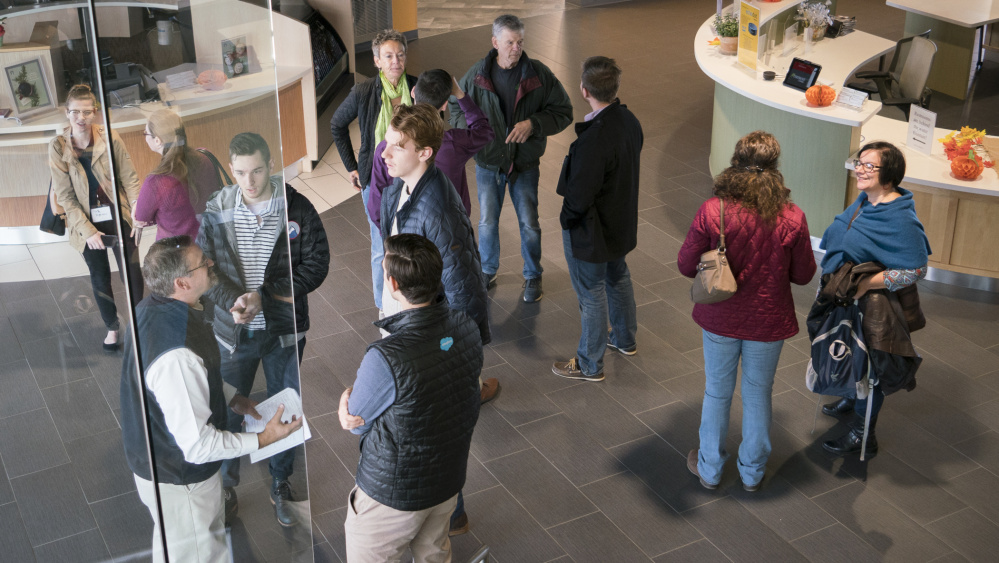WATERVILLE — Starting a business takes time, passion and a willingness to take a risk and jump in, according to three of the local business owners who spoke at central Maine’s first weekend centered around startups and entrepreneurship.
The Central Maine Converge and Create Weekend was held Nov. 17 and 18 at Thomas College, which partnered with local economic development organizations, institutions and businesses to make the event possible. Those who attended gained access to networking sessions, workshops, a keynote seminar and more.
On Saturday morning, three well-known locals talked about their experiences in starting businesses from scratch in the area at a breakout session called “Launching Your Business” moderated by Kimberly Lindlof, president and CEO of the Mid-Maine Chamber of Commerce, and attended by about 15 people.
‘WORKING ALL THE TIME’
Amber Lambke, CEO of Maine Grains in Skowhegan, spoke about how her greater vision has propelled the company forward.
Maine Grains, started in 2012, makes and sells organic flour, among other grain-based products, from Maine to New York City. Lambke knew from the beginning that it would take a community effort to make her business work. She’s trying to revitalize a small, local grains market that no longer exists in the United States, for the most part.
During her own research, Lambke found that while only 10 percent of flour used by artisan bakers is whole wheat, a consumer trend toward healthier products — whole wheat, organic — is rising across the nation and across demographics. And 99.9 percent of flour in the country is not organic, she said, meaning there is a big hole for her products.
“I just sort of happened on a realization that what’s happening here in Maine is actually pretty unique,” she said.
While Lambke kept her job in the beginning of the startup, she soon realized that to continue to grow, she would have to put all her effort into the business.
“There was a period before we jumped off the cliff, and there was the period after we jumped off the cliff,” she said to describe what she saw as the two phases of her startup.
Once Lambke and co-founder Michael Scholz needed to start raising money to buy equipment, “it got scary.”
Lambke sought out mentors from those in the community she looked up to. They told her to raise twice as much as she needed and to be prepared to work all the time.
“The question becomes, how do you take care of yourself in the midst of working all the time?” she said.
SHOWCASE THE STATE
Karen Getz, creator and founder of the Maine Crisp Co., a gluten-free and genetically modified organism-free specialty food company, came to Maine from Vermont with a penchant for carefully crafted food and a desire to showcase what her new state had to offer.
She moved to Maine with her husband for his job and was left wondering what she should do. She found a farmer who grew gluten-free buckwheat and saw a way she could fill a need.
“Coming from a state like Vermont that promotes itself so well … I just felt like Maine has so much to offer and more people should know about it,” Getz said, so she started baking crisps, using mostly Maine ingredients, in her kitchen.
Getz first financed the business with her personal money, budgeting the ingredient costs and just trying to create products so she could get feedback.
“I sort of jumped into it because I felt this need,” she said.
One of the largest challenges she faced was creating packaging that was both attractive and protective, she said. It’s believed that about 30 percent of a buyer’s choice is made by what’s driving them to pick a product up off the shelf, according to Getz, but she had to balance that consideration with the need to keep her delicate crisps intact.
BOOTSTRAPPING TO SUCCESS
Nate Towne, co-owner of Christopher Hastings Confections, got the business he runs with his husband, Mark Simpson, up and running in two months.
It started when a good friend asked the couple — known among family and friends for making high-end chocolates as a hobby — to sell some of their work at a craft fair.
“You always want to save up more money. You want to be more prepared before you start this business,” Towne said. “But gosh, everyone kept telling us, ‘You’re never going to do it if you don’t do it now.'”
They decided to say “yes” to the craft fair, and Towne, the marketing manager at Waterville Creates!, decided they also would need a website and an e-commerce platform.
“There was our coming out, in this little craft fair in Belfast, Maine,” he said.
Three years and a lot of bootstrapping later, their chocolate business is looking for ways to expand now. While Towne has kept his day job and runs the front end of the business, Simpson splits his time between work and making their sweets, which feature Maine-sourced ingredients and luxury chocolate.
Still, Towne said, they might need to hire help to make it through the busy seasons, which they realized when they ran out of bonbons at one point last year.
“I looked at my chocolatier husband, who was exhausted on Christmas Day, and I was like, ‘Oh, honey, I love you, but next year it’s going to be even worse,'” Towne said.
To continue to grow, they will need to decided which direction the business should go in.
“One of our challenges is trying to break into a cluttered market,” which is very difficult in wholesale, Towne said. Because of that, they are thinking about expanding the retail side of their business instead.
Madeline St. Amour — 861-9239
mstamour@centralmaine.com
Twitter: @madelinestamour
Send questions/comments to the editors.







